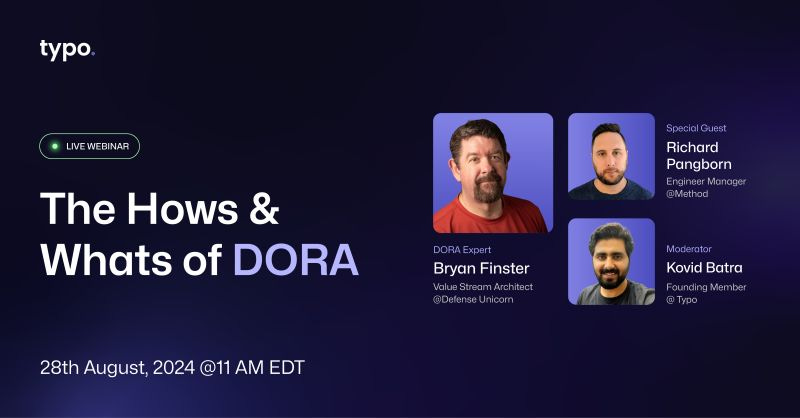Building the Right Thing, AI Tooling & Minimizing Cognitive Load
Issue #17 Bytes
☘️ Welcome to learning-rich Sundays ⤵️
🎙️Tune into Vladislav Maličević, CTO at Jedox: Build vs Buy debate
📈 Jedox's Evolution: Carving Out Market Space explores the role of open source, cloud transition, and pivotal decisions. Tune in as guest Vladislav Maličević and host Kovid Batra discuss Vlad’s 20-year journey at Jedox, along with insights on building vs. outsourcing and more. Catch the full episode below!
Article of the Week ⭐
Elite Performance is Wasted on Feature Factories
If a feature-driven team could deliver features faster than the ideas arrive, they would simply produce features for each demand. Steve Fenton is a six-time Microsoft MVP bringing his insights on how easily DORA Metrics can be misused in the wrong context.
Steve highlights the discrepancy in the incentives and goals of learning-driven teams and feature factories. Learning is based on the assumption that the team’s current assumptions are wrong and seek to run experiments with the products to prove or disprove them quickly and fairly.
Feature factories are working under the assumptions that delivering more code and features for a series of products is the way to scale revenue and success.
🧪 The experimental approach:
Introduce measurements to capture the current state.
Define an ideal target state.
Try an idea.
Determine the impact of the idea.
Learn and embed the knowledge.
Positive progress — Try another idea until the target state is reached.
Negative progress — Remove the changes and try something else.
🏭 The feature-driven approach:
Migrate images to a new storage technology.
Serve the images from a different domain.
Cache the images.
His key argument is that elite performance in the context of DORA metrics should be leveraged to maximize learning and impact, rather than simply increasing feature output. Backed by fast feedback, product iteration, rather than expansion enables more informed decision-making.
Short feedback loops aren’t about shorter (faster) feature delivery. They enable the the high performing teams to make crucial product decisions:
Are we building the right thing?
Are we building it the right way?
Is it as useful as we thought?
What detail needs to be tweaked?
A feature factory tends to make these decisions in a shallow, broad manner inbetween large batches of features that may be rolled out continuously. A learning-driven team focuses on interrupting work to make sure they are headed the right direction. To validate for customer value.
A naïve observer interprets the idea experiments within engineering teams as an excuse to miss deadlines or shirk expectations. But a product-led team treats it more like an A/B test, a context which doesn’t shy using the word experiment—its goal is to produce data to eliminate non-viable routes of all possible branches to pursue. A feature factory pursues all of them in parallel.
📺 Implementing DORA Metrics?
Talk to DevOps experts - Upcoming Live Session
Typo is back with its 2nd edition in collaboration with DORA and DevOps expert, Bryan Finster and EM from Method: CRM Richard Pangborn, for "The Hows & Whats of DORA." The webinar, scheduled for August 28, 2024, will provide practical tips for mastering DORA metrics and enhancing your engineering processes. Don’t miss this boomerang moment!
Other highlights 👇
AI Tooling for Software Engineers: Reality Check (Part 2)
AI in software is a hot topic. Some find it a fad, some think it’s the future. Be it as it may, no engineering teams are being replaced by autonomous brain-programs that churn out code while you sleep. At least that seems to be the obvious desire of AI in an industry that specialises in communication, writing and problem-solving. Software doesn’t require any heavy machinery or contact with the elements of the real world outside of providing hardware—so why is the AI tooling with LLM’s in software design and coding so far from expectations?
Gergely Orosz, the author of The Software Engineer’s Guidebook and The Pragmatic Engineer publication has new insights to share.
LLMs / Copilots are like…
… autocomplete
… pairing with a junior programmer
… an eager intern
… a tutor or coach
… an assistant
… pre-Google search
These comments are by engineers with decades of experience who are no strangers to their own limits and the demands of the real world.
Time saved – and what it’s used for. Some respondents save almost no time, while others say AI tools create 20% more time for other things.
The scope in which LLM’s are universally beneficial seems to be limited to initial-prototyping and creating a first draft-like document to kickstart engineering efforts past the “empty canvas” block.
In most other areas, experiences and feedbacks are mixed, erring onto the side of “the technology isn’t ready yet” and dissatisfaction with hallucinations and effort required to continuously fix-prompt.
How Good Boundaries can Minimize Cognitive Load
Fred Wynyk at Workday shares his experience adopting Team Topologies ideas to grow a small Platform team into serving a well-structured domain.
Initially, their Platform Team was small, dealing with a broad range of responsibilities, for the most part cloud ops and testing. This increased cognitive load initially, especially during a transition from Heroku to AWS and integration with Workday's processes. Despite growing the team, the workload remained unmanageable despite their best efforts due to overlapping domains of responsibility and excessive cognitive demands.
They had to deal with a common tangle natural to organisations as they grow, especially startups. As the teams increased in the number of members and scope of work, their respective areas of overlap and communication needs clashed to the point of grinding product improvements to a halt.
At the same time they were balancing efforts to recruit more engineers and mentor them, while restructuring the leadership make-up to better fit particular domains. They went from a all-hands monolithic approach to cloud engineering and SRE to separate teams with a service-focused mission and autonomy.
The D-DAY!
Deployment Day Frenzy! Time to hit that button (And, Peter did it anyway) — who’s weekend did we shake this time?
That’s it for Today!
Whether you’re innovating on new projects, staying ahead of tech trends, or taking a strategic pause to recharge, may your day be as impactful and inspiring as your leadership.
Hope you signed for your 1:1 Mentorship session!
See you next week(end), Ciao 👋
Credits 🙏
Curators - Diligently curated by our community members Denis & Kovid
Writers of the week - Steve Fenton, Gergely Orosz, Fred Wynyk
Sponsors - This newsletter is sponsored by Typo AI - Ship reliable software faster.
1) Subscribe — If you aren’t already, consider becoming a groCTO subscriber.
2) Share — Spread the word amongst fellow Engineering Leaders and CTOs! Your referral empowers & builds our groCTO community.






